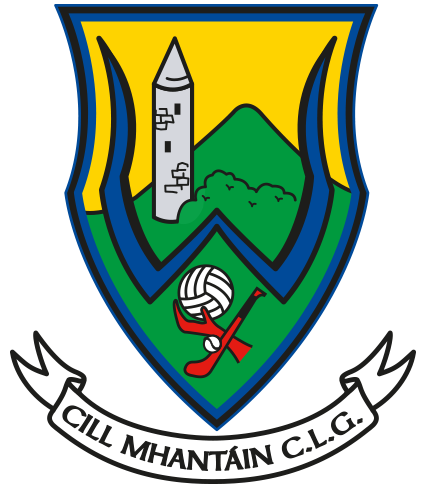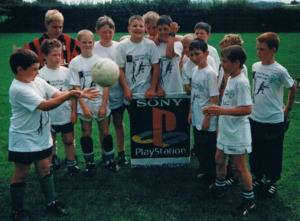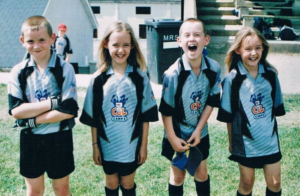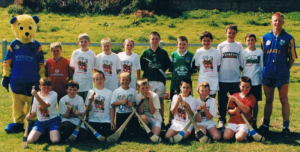Wicklow GAA ‘COACH NEWS’ Week 4
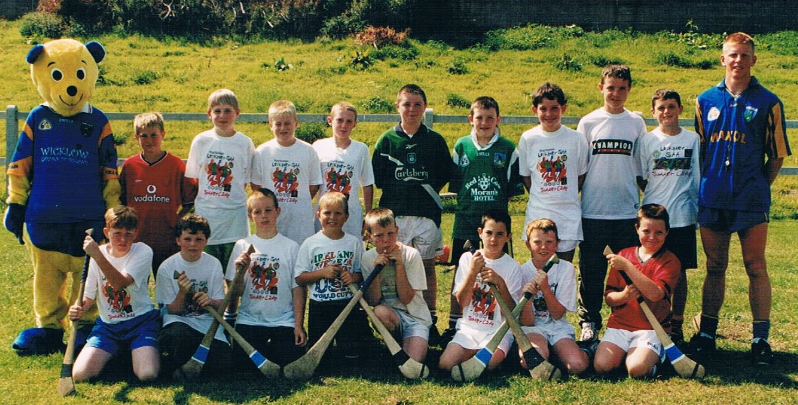
Whether you are a first time coach, a seasoned campaigner, or returning after some time away, we hope that you have already started interacting with your players this year. As coaches we are responsible for developing and teaching your players to get the best out of themselves, both on and off the field. Gaelic Games is a sport that is always evolving and that means that as a coach, you need to stay ahead of the curve. The best coaches are those with their fingers on the pulse, who have a wealth of Football/Hurling coaching resources and who are constantly reinventing themselves to include the latest ideas, practices and style within their sessions
Small Sided Games – Learning the Game through Involvement Introduction:
Small sided games are an extension of fun games and grid games but are basically a smaller version of the full games. The benefit of small sided games includes increased involvement through plenty of ball contact, movement, skill under game pressure, and more decisions of the attacking and defensive nature. This will assist your players in having a greater appreciation of the game. The coach can always adapt these games to suit the needs of their playing group at any age level.
Why use Small Sided Games?
- Can cater for all levels of ability.
- Individuals can improve at a rate appropriate for them.
- Coaches can put players of similar ability marking each other, or play different small sided games.
- More touches of the ball for each player
- Increased work rate/Intensity
- Develops tactical awareness.
- Makes training enjoyable and increases motivation to participate.
- Takes pressure off inexperienced coaches and creates positive interaction between players and coaches.
- Fosters a feeling of being part of a team.
- Helps avoid development of techniques that don’t transfer into the game.
- Enhances players’ understanding of rules.
- Provides ideal situations for a questioning approach which improves players understanding and helps them figure solutions out for themselves
Conditioned Games
A condition games is one where the players are forced to use a particular skill that the coach decides needs practice in a game by playing certain conditions or rules upon the game and players. There are several useful condition games, it is important that the rule changes and conditions be clearly explained and demonstrated beforehand. A free kick is awarded against players breaking the conditions. Conditioned games can be a very effective tool. They can be used to motivate and deepen learning.
Conditioned games have many learning advantages including;
- Allowing players to practise skills in context. Players get to see how the skill is dependent on many contributing factors and moments. Promoting links with movements, space creation and other players
- Recognising triggers; one of the most crucial aspects and advantages is the player selecting the correct ‘moment’ in which to use the skill. Conditioned games allow creative practice, reflection, adaptation and the observation of the effect.
- Allows players to recognise the purpose of the skill through its effect on the game or situations within it.
- Can allow players robust transfer into actual full game situations
Here is a list of some of the conditions you can practice with your team in game situations.
- One solo, one hop
- Hand pass with the right & left hand only
- Kick pass with the left or right foot only
- Players to call a name before passing and receiving
- When you pass you must get the return
- You can’t pass the ball backwards
- You can’t pass the ball forwards
- All players have to be inside the half way line before your team can score
- You must solo the ball before you pass
- All players must get a pass before your team can score
- Restrict the number of passes before you can score
- Player in possession has three seconds to get rid of the ball, or the ball is turned over to the opposition
- Hand pass followed by a kick pass
Gaelic 15 Warm Up
If we think back to last season we could all probably think of a team or even our own team who had players missing for vital games. Could these players have made a difference to the final result? The question for us as coaches is, can we be proactive in stopping these injuries from occurring. There are a number of ways to do this but one of the simplest ways to start this process is by introducing the Gaelic 15 injury prevention warm up. There are always going to be injuries in Gaelic games and nobody involved in coaching is naive enough to think you can avoid all injuries, but as you read through this piece think about avoidable injuries such as “soft tissue muscle injuries” and “non-contact type injuries”. These injuries are avoidable or at the very least can be greatly reduced. Coaches play a role in preventing these injuries rather than reacting when it is too late. Finally, one of the criticisms of the warm up is that it does not involve a football or hurl. I would advise coaches to do the Gaelic 15 warm without the ball or hurl for the first six weeks so that you; the coach and the players can get to know the structure of the warm up and all the exercises. Once everyone is familiar with the techniques and structures, you can be creative and integrate a football or hurl into the warm up once you follow the correct sequence and structure outlined by the warm up.
The programme takes fifteen minutes in total to complete, which can be carried out as a standardised warm up before training and games. The programme is divided into three sections:
- Section 1: Running
- Section 2: Improving mechanics and limiting risk of injury
- Section 3: Sports specific movements
A useful resource for the Gaelic 15 warm up is the GAA e-learning website http://learning.gaa.ie/GAA15 you can access individual exercise videos & obtain printable PDF`s of warm-up structure and exercise pictures with relevant exercise instruction.
Coaches Diary
By maintaining a coach’s diary over the season is very important for the development of your team and players. The coach’s diary can be invaluable as a future reference for planning & organisation. Once you have a structure, and have identified your objectives and content for your coaching session, you are then ready to complete the fine points of your session plan. Keep in mind that some of your objectives will be attainable in one coaching session, while others may take a number of sessions or even an entire season to attain. You can plan from week to week, or by the month by setting Goals & objectives based around the player’s performances in Coaching & Games. By having a detailed diary, it makes the coaches job that bit easier and more professional.
Below are some of the inputs a coach can include in their Diary.
- You can make notes on individual coaching sessions
- Record performance
- Record attendance
- Fixtures Programme
- Tactics
- Notes on Opposition
- Team talks
- Pick team
- highlight areas for further coaching, and note any injuries etc.
Effective Feedback
The ability to provide effective feedback is an important tool for coaches to have. Good feedback can result in dramatic improvements in comprehension, awareness and skill, however Bad Feedback can alienate, discourage and bring about a decrease in player skill level. Effective provides information that helps learning and development of skills and attitudes.it can positively affect maturation, learning and self-image, and can be the key to motivation. Players should be allowed to practice for a period of time, which arises with the complexity of a skill before offering them feedback, by observing for a longer period. Correct one effort at a time, allowing more practice time before attempting to correct other errors. What the coach says as part of the error correction must give the player the information with which to improve the individual performance.
Positive reinforcement will hasten skill development – shouting and criticising will achieve very little. Highlight what the player is doing right, and then provide feedback relating to errors. Feedback is effectively given by verbal reports, physical cues, key checklists, video replays and or peer comments. The style of feedback depends on the availability of resources, type of skill and the personality of the player.
Providing Proper Feedback to your players must be:
- Specific and concise Make sure that your feedback is specific and accurate and does not include too much general information. Feedback is best when it only concentrates on a few small points of a skill performance rather than the skill performance as a whole.
- Positive and immediate It is beneficial if your feedback occurs immediately after a skill performance. This will allow players to consider your feedback while the performance is fresh in their memory. Positive feedback is important to build and maintain the confidence of your players.
- Constructive (performance-based) Feedback must be concentrated on areas of performance that players can physically improve in their next performance. Constructive feedback needs to concentrate on areas like movement and positioning during skill performances.
- Individual and/or group Feedback can be provided to both individuals and groups and can be based on both individual and group performances. It is often beneficial to provide positive feedback to the group and individual corrective feedback directly to individual players.
- Offering remedial solutions Feedback must offer corrections rather than criticisms. Feedback should be used to encourage and correct performance and therefore the players must be able to physically act upon your feedback to improve their performance.
- Encouraging self-assessment/reflection Coaches are encouraged to use questioning as a method of enabling players to improve their performance. Rather than telling the players what to do, coaches are encouraged to ask the players about their performances and work together to develop corrective actions.
Player Profile
Name: Fíachra Browne
Club: Éire Óg Greystones
School: Gaelscoil na gCloch Liath
Age: 12
- My favourite GAA player? Enda Smith, Roscommon footballer. He sent me a lovely message on my birthday last year.
- My favourite GAA grounds? Croke Park, has a great atmosphere at matches.
- My favourite playing position? Full forward, (Hurling).
- My favourite food? Homemade burgers.
- My favourite music? ‘7 Years’ by Lucas Graham
- My favourite TV film/programme? Jumanji: Welcome to the jungle – funny action movie.
- What I think is the most important skill in the game? Being able to strike from both sides.
- What is your favourite GAA drill/activity? Paired striking.
- In 10 years’ time I hope to be? Leading Wicklow hurling team to Croke Park.
- My favourite team in any sport? Éire Óg U13’s.
- If I won, the Lotto I would? Take a long sunny holiday with my family.
- Do you play any other sports? Just Hurling and Gaelic, I used to play rugby.
- What are your hobbies? Sport, reading, gaming and cooking.
- My pet hates are? Some U13 Hurling rivals in Co Wicklow…..
- My favourite PlayStation game is? Fortnite online with my friends.
Quote of the week:
“A coach should never be afraid to ask questions of anyone he could learn from.”
Bobby Knight, Basketball
Three Weekly Coaching Tips:
- Teach the players to Give Respect and Get Respect in training & games
- Keep a detailed diary/log and record all coaching & games activities done by players and team
- Run your drills to force players to ATTACK THE BALL. They must learn to take the risk and move to meet the ball, no matter what way it comes to them.
You can contact us:
We also invite emails from Wicklow People readers/coaches if they would like any topic or area covered in more detail in our “Coach’s News” section. Coaches can email their queries and questions to hugh.kenny.gamesmanager.wicklow@gaa.ie and we can address them by providing the relevant information each week.
St. Patrick’s hurling camp
